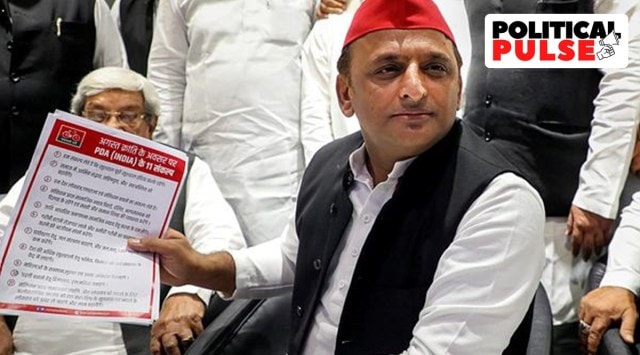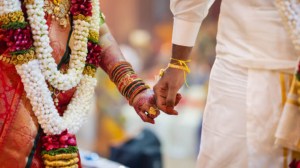To reach out to non-Yadav Other Backward Classes (OBCs) after losing prominent OBC leaders such as Om Prakash Rajbhar and Dara Singh Chauhan to the BJP-led National Democratic Alliance (NDA) in Uttar Pradesh, the Samajwadi Party’s (SP) 182-member state executive committee on Sunday announced the appointment of 30 office bearers from the non-Yadav OBC groups, who for 43% of the total 70 office-bearers. In comparison, non-Yadav OBCs constitute 26% of the BJP’s 45-member executive team. The SP is also in the process of stepping up its demand for a caste census and kickstarting the second phase of its campaign on the issue.
The second-largest representation in the SP’s state team is for Muslims with 12 members (17%), followed by 10 from Scheduled Castes and Scheduled Tribes (14%). With five members from each community, the share of Yadavs (OBC) and Brahmins is 7% each. With the changed composition of the reconstituted executive committee, SP national president Akhilesh Yadav has demonstrated his approach towards the PDA constituency — Pichhde (backward classes), Dalits, and Alpsankhyak (minorities) — an acronym he coined with an eye on the 2024 Lok Sabha polls. Apart from 12 Muslims, the SP has also inducted one Sikh and one Christian in the top body.

According to political parties in the state with a strong OBC base, account for 9% of the state’s OBC population while non-Yadavs make up 32%. Yadavs form the SP’s core voter base in UP but the party came to power in the 2012 Assembly polls, winning 224 of the total 403 seats, on the back of support from Muslims and other OBCs. In the 2017 Assembly polls, a larger chunk of non-Yadav OBCs drifted towards the BJP, following its alliances with the Apna Dal (Sonelal) and the Suheldev Bharatiya Samaj Party (SBSP), which have their bases in various backward classes.
A year later, the BJP lost the Gorakhpur and Phulpur Lok Sabha by-polls when the SP allied with Mayawati’s Bahujan Samaj Party (BSP), the Rashtriya Lok Dal (RLD), and the Nishad Party. The Nishad Party is backed by the Nishad community, which has a sizeable presence in Gorakhpur and Phulpur. In its new state team, the SP has inducted three Nishad leaders.
In the 2019 Lok Sabha polls, with the support of the Nishad Party and the Apna Dal (Sonelal), the BJP-led NDA won a majority of seats but ceded 15 to the SP-BSP alliance.
Considering the political significance of non-Yadav OBCs, Akhilesh Yadav formed an umbrella alliance in the 2022 Assembly polls with Om Prakash Rajbhar’s SBSP, along with other OBC-based parties such as RLD, Apna Dal (Kamerwadi), Janwadi Party (Socialist), and Mahan Dal. The SP also managed to lure prominent OBC leaders from the BJP, including Swami Prasad Maurya, Dara Singh Chauhan, and Dharam Singh Saini.
The alliance managed to bring the BJP down a few notches. While the SP’s seat tally increased from 47 to 111, the BJP’s seat count fell from 312 to 255. In the 2017 state polls, the total vote share of the SP-Congress alliance was only 28%. But in 2022, the vote share of the SP-led umbrella alliance rose to 36.4% – 7.5% lower than the NDA’s vote share.
Story continues below this ad
After the elections last year, the SBSP and the Mahan Dal quit the alliance with the SP. The SBSP has since rejoined the NDA while the Mahan Dal is now supporting the BSP.
Given that BJP allies SBSP, Nishad Party and Apna Dal (Sonelal) have a hold on OBC communities largely in eastern and central UP, the SP’s new state team has the most non-Yadav OBCs (15) from these two regions. From western UP, where the SP is allied with the RLD, the party has included seven non-Yadav OBC leaders in the executive team. The committee has two leaders from the Shakya community, which is dominant in the SP’s bastion of Mainpuri. The BJP had tried to reach out to Shakya voters by fielding a candidate from the community. “Shakyas are ideologically with the BJP. But they supported SP in Mainpuri because SP founder Mulayam Singh Yadav in his governments had obliged them a lot,” said a senior BJP leader.
Akhilesh took the first steps towards removing the tag of a “Yadav-centric” party in 2017 when he took control of the party and appointed Naresh Uttam Patel, an OBC leader, as the SP’s state president. Uttam replaced Akhilesh’s then-estranged uncle Shivpal Singh Yadav. Before Shivpal, Akhilesh had been the party’s state unit chief since 2012 but in September 2016, his father Mulayam appointed Shivpal as state president, leading to a rift between the uncle and the nephew.
With an eye on OBC votes, the SP has been raising the demand for a caste census in the state for the past year. The party’s aggressive stand on the caste census compelled the BSP to go a step further and demand a nationwide caste census. Though the SP raised the matter in the Monsoon Session of the Assembly last week, the Yogi Adityanath government said it does not plan to conduct a caste census in UP since it is a matter on which the Centre will make a decision.
Story continues below this ad
SP’s OBC cell state president Rajpal Kashyap who ran a 10-day campaign in east UP in February-March to press the demand for a caste census said the party would launch the second phase of the campaign next month. Kashyap said that of the 98 district presidents of the OBC cell, there were only four Yadavs and the remaining presidents were from other backward castes such as Rajbhar, Lodhi, Kashyap, Patel, Gangwar, Chaurasiya, and Savita. “At meetings during the campaign on caste census, we will tell people that the BJP created the propaganda that SP is a party of one caste only. The fact is that the party gave representation to all castes in the organisation and the governments in the past,” Kashyap said.

































